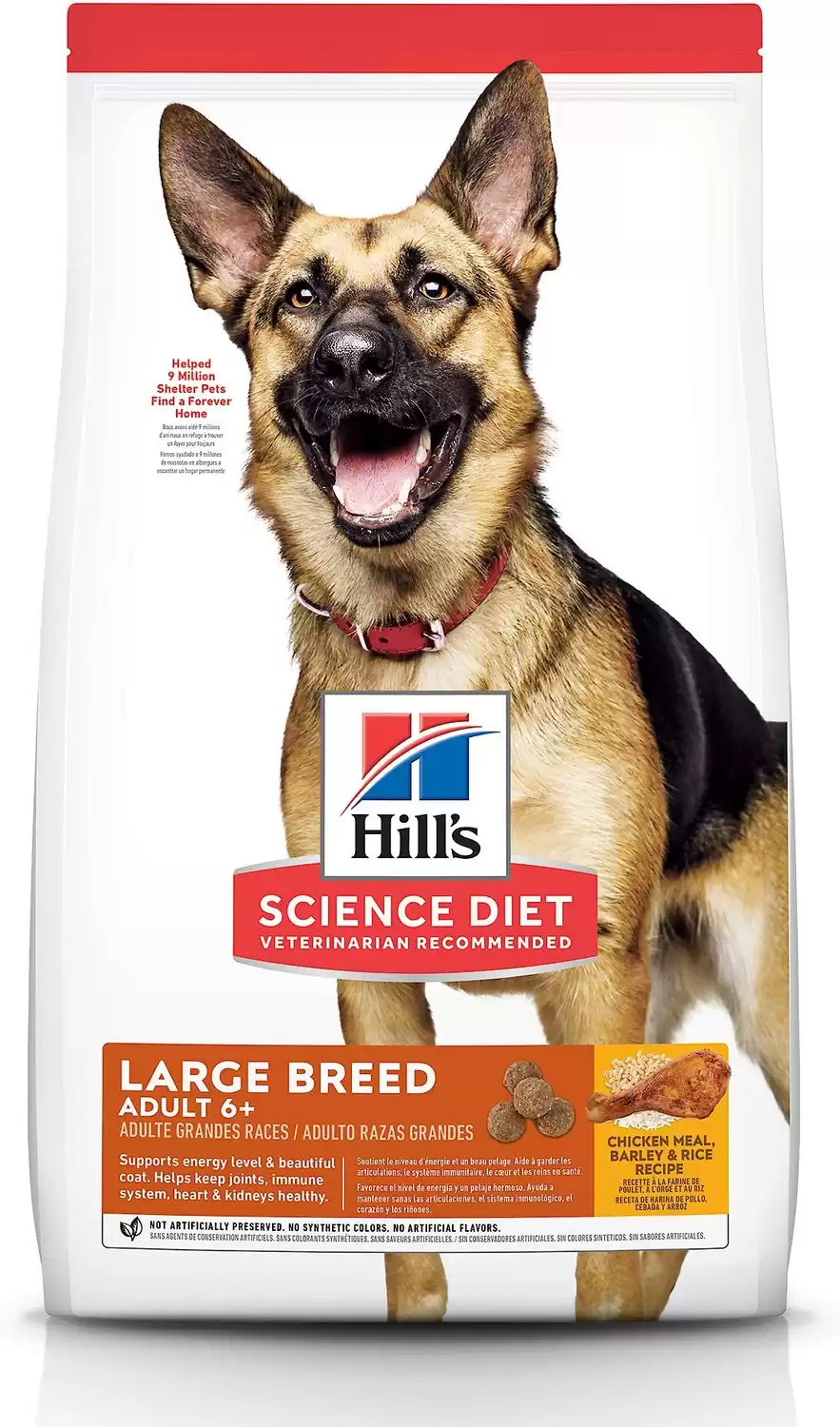Shepadoodle
Canis lupus
Some police officers with allergies use Shepadoodles as their K-9 partner
Advertisement
Shepadoodle Scientific Classification
- Kingdom
- Animalia
- Phylum
- Chordata
- Class
- Mammalia
- Order
- Carnivora
- Family
- Canidae
- Genus
- Canis
- Scientific Name
- Canis lupus
Read our Complete Guide to Classification of Animals.
Shepadoodle Conservation Status
Shepadoodle Facts
Shepadoodle as a Pet:
- General Health
- Energy Level
- Shedability
- Trainability
- Intelligence
- Tendency to Chew
- Size
- Family and kid friendliness
- Yappiness / Barking
- Low
- Separation Anxiety
- High
- Preferred Temperature
- Average climate
- Exercise Needs
- Moderate
- Friendly With Other Dogs
- High
- Pure bred cost to own
- $800
- Dog group
- Working
- Male weight
- 50-90 lbs
- Female weight
- 50-90 lbs
This post may contain affiliate links to our partners like Chewy, Amazon, and others. Purchasing through these helps us further the A-Z Animals mission to educate about the world's species.
View all of the Shepadoodle images!
What do you get when you breed a German Shepherd with a poodle? A Shepadoodle! Shepadoodles belong to the hybrid group of dogs. They are intelligent, brave, and devoted to their owners.
The history of the Shepadoodle dates back to the 1960s. They were bred to work alongside the military police in the US Army. Their energetic nature and courage make these dogs a great help to the military police.
See all of our expert product reviews.
These dogs are popular with families, with or without children, due to their affectionate temperament and devotion.
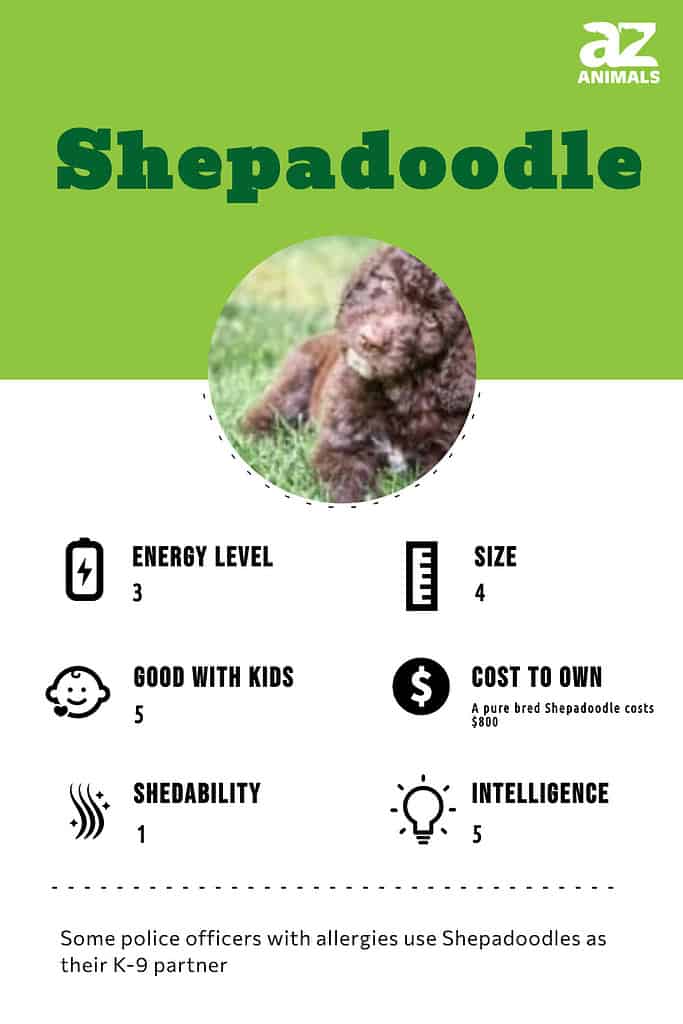
The 3 Different Types of Shepadoodles and Shepadoodle Mixes
- Standard Shepadoodle
- Mini Shepadoodle
- Toy Shepadoodle
3 Pros and Cons of Owning a Shepadoodle
| Pros! | Cons! |
|---|---|
| A friendly, affectionate canine Shepadoodles are great for families with children because they are gentle and affectionate pets. | Separation anxiety These dogs like to be with their families. Leaving them alone for long periods of time may cause these dogs to start chewing or destroying items in a home. |
| An excellent watchdog They are on the alert to anyone who enters a family’s property. | Moderate exercise needed These dogs need around 60 minutes of exercise each day. This is necessary to maintain the dog’s health. |
| Low shedding Though these dogs are considered to be hypoallergenic, they do shed a small amount of hair. This makes grooming fairly easy. | Not apartment-friendly Due to their size and energy level, these dogs aren’t suited for living in an apartment. |
Size and Weight

Shepadoodles reach adulthood between 15 – 18 months
©Holly Michele/Shutterstock.com
They come in a few different sizes. There’s the toy, mini, and standard Shepadoodle. A standard Shepadoodle can grow to be 28 inches tall from head to toe. Furthermore, they can weigh up to 90 pounds fully grown. These dogs weigh about 10 pounds at 8 weeks old. They are considered fully grown at 15 to 18 months.
| Height (Male) | 28 inches tall |
| Height (Female) | 28 inches tall |
| Weight (Male) | 90 pounds, fully grown |
| Weight (Female) | 90 pounds, fully grown |
Common Health Issues
The Shepadoodle has some common health issues to consider. One of those issues is bloat. This condition occurs when a dog’s stomach fills up with liquid, air, and food. The dog’s stomach puts pressure on other organs decreasing the supply of blood flowing to them. A distended abdomen, retching, and shortness of breath are all symptoms of this condition. Bloat is a serious condition and needs to be addressed by a veterinarian ASAP.
Health and Entertainment for your Shepadoodle
See all of our expert product reviews.
Degenerative myelopathy is another common health condition of Shepadoodles. It is a disease affecting the spinal cord causing weakness and sometimes paralysis in a dog’s hindquarters. Ensuring a Shepadoodle maintains a healthy weight can help to prevent this condition. Physical therapy is sometimes used to treat degenerative myelopathy. In simple terms, Patellar luxation is a dislocated kneecap. Limping is a symptom of this condition. Sometimes surgery is necessary when a Shepadoodle has a severe case of Patellar luxation.
- Bloat
- Degenerative myelopathy
- Patellar luxation
Temperament and Behavior
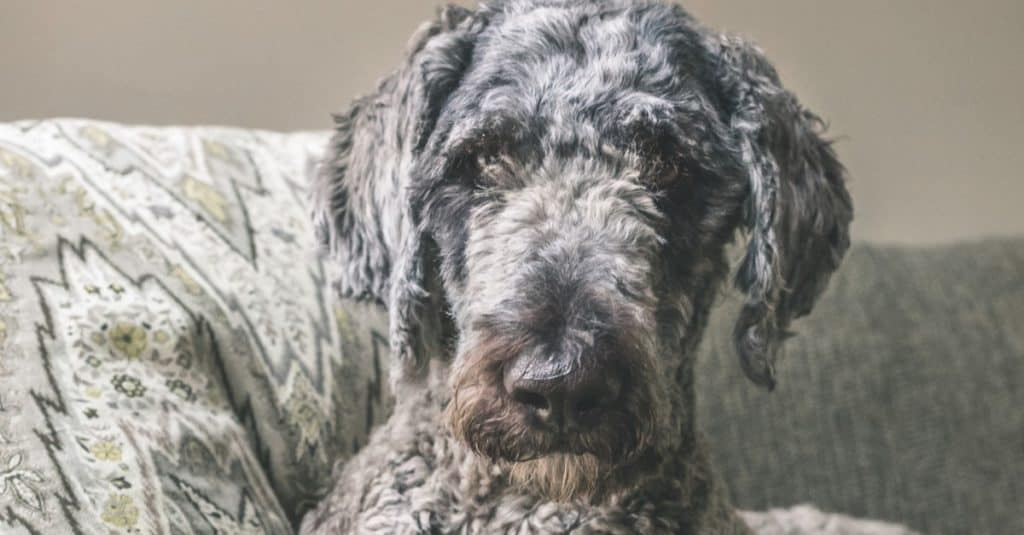
Shephadoodles were bred to provide support to the US military
©Holly Michele/Shutterstock.com
These dogs have a friendly personality and a gentle temperament. They’re good with children of all ages and are always ready for an energetic game of fetch or hide and seek!
A family looking for a diligent watchdog is going to be pleased with a Shepadoodle. After all, these dogs were bred to work alongside the military police in the US Army! This dog’s bark alerts family members of someone at the door or a stranger on the property. Devotion to its owner is one of the most valued traits in the dog.
How to Take Care of a Shepadoodle
Getting as much information as possible about these dogs can help an owner to take excellent care of this loyal pet. Before getting a puppy or adult Shepadoodle from a breeder or rescue organization, it’s best to learn about its diet, exercise needs, grooming requirements, and common health issues. Look at some helpful information:
The Best Dog Food for Shepadoodles
The diet an owner feeds to a puppy or adult dog can have a big influence on its overall health. Check out some facts regarding the diet of puppies and adult dogs.
Puppy food: High-quality protein supports the growing muscles, tendons, and cartilage of Shepadoodle puppies. Fat in their diet gives them the energy that supports the activities of this rambunctious canine. Vitamin E is an antioxidant that contributes to a puppy’s healthy immune system. Glucosamine and chondroitin are nutrients that add to the joint and bone health of these puppies. Supporting joint and bone health can help this hybrid breed to avoid Patellar luxation.
Adult dog: High-quality protein in the form of chicken or fish helps to keep an adult dog’s bones and muscles healthy. A limited amount of carbohydrates in an adult dog’s diet gives them energy without adding extra weight. Omega fatty acids contribute to the healthy skin and coat of this canine. Vitamin A supports the muscles and nerves of this dog. Calcium is important to keep their bones healthy and strong. This is important for a dog prone to Patellar luxation.
As a note, an owner can take simple steps to prevent bloat in their Shepadoodle. One tip is to feed the dog small portions of food, so they don’t gulp down too much food in too short a time. Also, feeding a Shepadoodle a mixture of wet and dry food can slow it down.
An adequate diet is essential to sustain Shepadoodles’ bones and joints. So A-Z Animals recommends Hill’s Science Diet Dry Dog Food, Adult, Large Breed, Healthy Mobility for Joint Health.
Specifically created for large dogs, this recipe has glucosamine and chondroitin to build cartilage and keep Shepadoodles’ joints mobile. There’s a special mix of minerals for healthy bones, vitamins including vitamin A for the skin, coat, and nervous system, and L-carnitine for muscle, brain, and heart function.
Check Chewy and Amazon for this product.
Maintenance and Grooming
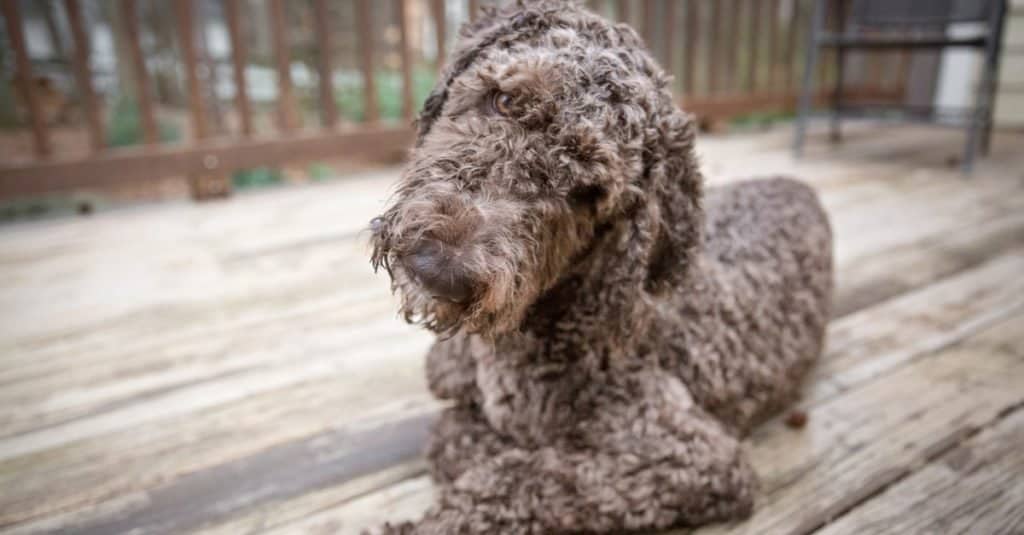
The likelihood of a shepadoodle shedding heavily or lightly depends on the coat it inherits
©Holly Michele/Shutterstock.com
How much do these dogs shed? Though they are thought to be hypoallergenic, these hybrid dogs shed a low amount of hair. One thing to keep in mind is that if a Shepadoodle inherits the coat of a poodle, then it will shed a small amount of hair. Alternatively, if a Shepadoodle inherits its coat from the German Shepherd side of the family, it’s going to shed a bit more.
Shepadoodles need to be brushed twice per week. A slicker brush is an effective grooming tool for this dog. This brush removes loose hair, gets rid of tangles, and stirs up healthy natural oils. A comb can be used to go over the dog’s coat to ensure all tangles have been removed.
Brushing should begin at the head and end at the tail. Move the brush in the natural direction of the hair unless a tangle or mat needs to be removed. Loosening a tangle can be easier if an owner moves the brush in a sideways or downward direction. Be sure to brush gently and avoid pressing the brush too firmly against the dog’s skin.
Shepadoodles can suffer from various skin conditions including sebaceous adenitis. Symptoms of sebaceous adenitis include itching, red spots, and flaky areas. This condition can be managed with specific types of shampoo as well as antibiotics.
Training
Shepadoodles are eager to please and intelligent. This makes them easy to train. They are able to absorb and retain obedience lessons fairly quickly. This is no surprise considering this dog is a descendant of two dogs known for their intelligence!
Another doodle, the Labradoodle is easy to train as well.
Exercise
A Shepadoodle is an active dog that needs around 60 minutes of exercise each day. This exercise requirement can be met by taking a walk through the woods or neighborhood. Taking this dog to a dog park is another good idea. Some owners split the exercise routine of this dog giving it one 30-minute walk in the morning and a walk in the woods in the evening. Of course, playing fetch or chase is another fun way to give this pup its daily exercise!
A standard Shepadoodle is not appropriate for apartment living. This dog is too large to comfortably live in an apartment. Alternatively, a toy Shepadoodle weighing less than 35 pounds would be a better option for someone who lives in an apartment. Of course, an hour of daily exercise would still be needed.
History
The first documented “doodle” dog breed which was a Labradoodle was bred in the 19080’s. After that, the demand for “designer” dog breeds took off. This has exploded into an interest in crossing poodles with different types of dog breeds such as German shepherds.
The American Kennel Club doesn’t recognize such dog breeds as the shepadoodle mix as an official breed, so there are no exact guidelines for appearance or temperament. Without any type of formal breed registration, there is little known about how the breed truly came to be.
However, we may not know about the beginnings of the shepadoodle, we do however known that the parents to this pups have a rich history. Poodles originated as hunting dogs in Germany and are the national dog breed of France. Additionally, German shepherd are another German breed that have been used as working dogs for militaries and police departments worldwide.
Puppies
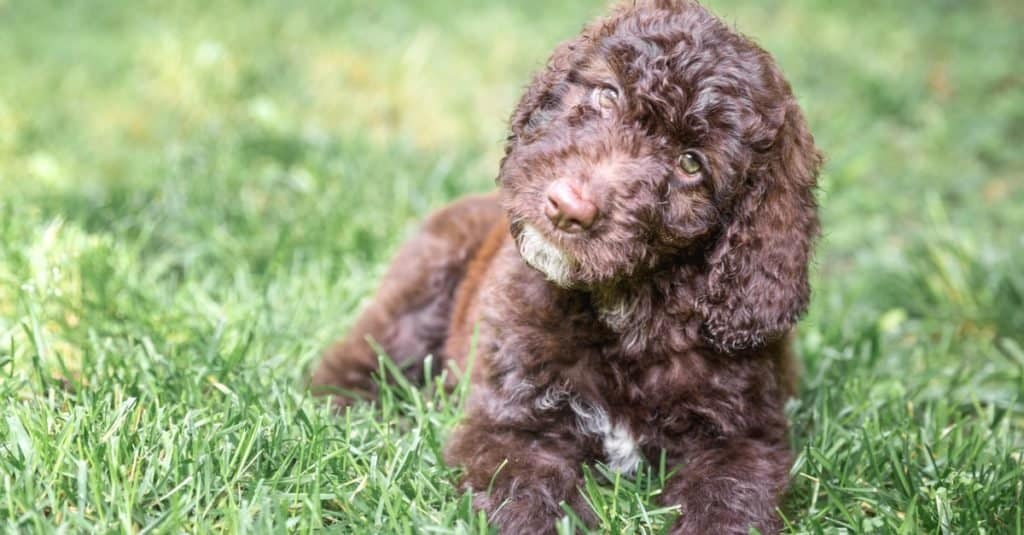
Shepadoodles are ideal companions for children owing to their gentle, affectionate nature
©Holly Michele/Shutterstock.com
It’s best to start socializing Shepadoodle puppies as soon as possible. Getting them used to be around people and building trust can help make obedience training easier.
Children
Shepadoodles are popular with families because they are good with children. These dogs are affectionate and gentle while still being playful. This is a personality combination that suits both the kids and the adults in a family!
Dogs Similar to Shepadoodles
Other dogs that are similar to Shepadoodles include Labradoodles, Whoodles and Schnoodles.
- Labradoodle – Both of these hybrid breeds are energetic, smart, and playful. But an adult standard Labradoodle is heavier than a Shepadoodle.
- Whoodle – A Whoodle is a cross between a Wheaten Terrier and a poodle. Like a Shepadoodle, these dogs can have brown or black fur. They are both friendly and affectionate hybrids. In terms of grooming, the Whoodle requires a more elaborate grooming routine than a Shepadoodle.
- Schnoodle – This schnauzer, poodle mix is affectionate and intelligent like a Shepadoodle. However, a Schnoodle is smaller in size and weighs less than a Shepadoodle.
Now that’s a lot of oodles!
Popular Names for Shepadoodles
Popular names for Shepadoodles include:
- Chloe
- Daisy
- Ashton
- Duke
- Harley
- Lola
- Maya
- Chief
Shepadoodle FAQs (Frequently Asked Questions)
What is a Shepadoodle?
A Shepadoodle is a cross between a German Shepherd and a poodle. There are three types of these dogs including the toy, mini and standard Shepadoodle. The difference has to do with the size of each dog, specifically its weight. The toy weighs 35 pounds or fewer, the mini weighs from 35 to 45 pounds and the standard weighs from 45 pounds to 90 pounds.
These dogs are friendly, gentle, and loyal.
How much does a Shepadoodle cost to own?
The initial price for this dog is around $800.
The yearly vet costs for this hybrid breed range from $200 to $400. The exact cost depends on the services the dog needs.
The monthly food costs for this dog range between $40 to $50.
Are Shepadoodles good with kids?
Yes, Shepadoodles are good with kids.
How long does a Shepadoodle live?
The lifespan of this dog is 12 to 15 years.
How much does a Shepadoodle cost?
The initial price of a Shepadoodle is around $800. Of course, the price is going to differ from breeder to breeder.
A family that wants a Shepadoodle may want to consider a rescue organization. The price for a Shepadoodle is going to be less when a family works with a rescue organization.
Are Shepadoodles good dogs?
Yes. They are good dogs that are eager to please!
Are Shepadoodles smart?
Yes! Shepadoodles are known for their intelligence. This hybrid breed is the product of two highly intelligent dogs, the German Shepherd, and the poodle. This quality is what makes training these dogs so easy.
Are Shepadoodles hypoallergenic?
Though some people categorize them as hypoallergenic, Shepadoodles shed some hair. However, they shed a very small amount.
Thank you for reading! Have some feedback for us? Contact the AZ Animals editorial team.
Sources
- Wag Walking, Available here: https://wagwalking.com/breed/shepadoodle
- Lover Doodles, Available here: https://loverdoodles.com/pros-and-cons-of-owning-a-shepadoodle/





